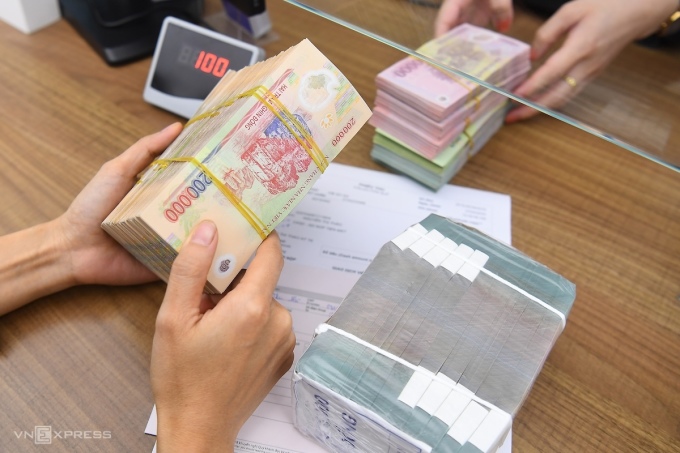Mr. Ho Duc Phoc assessed that corporate bonds are a good capital mobilization channel, with room for development of up to 1.5 million billion VND.
The incident of SCB Bank and Van Thinh Phat Group at the end of 2022 caused the corporate bond market to continue to face many difficulties in the first 3 months of 2023. However, after the Government issued Decree 08 in March 2023, the market has shown many improvements with signs of investor confidence returning.

Mr. Ho Duc Phoc, Minister of Finance. Photo: Ngoc Thanh
Speaking to the press earlier this week, Finance Minister Ho Duc Phoc said that corporate bonds are still a good capital mobilization channel and there is still much room for development.
The Minister said that according to the strategy, the channel for mobilizing individual corporate bonds will account for about 25% of GDP. Currently, the outstanding balance of corporate bonds is only about 1 million billion VND, equivalent to 10% of GDP, mainly issued by commercial banks. "This is a low level," Mr. Phoc assessed.
Mr. Phuc said that the room to mobilize individual corporate bonds is about 15-16% of GDP, equivalent to about 1.5-1.6 million billion VND. This source of capital will solve capital difficulties and help develop businesses.
Sharing the view that bonds are still an important capital channel, Mr. Nguyen Tung Anh, Research Director of FiinRatings Joint Stock Company, said that in recent years, if capital had not been raised through bond issuance, many businesses and the banking system would have suffered many burdens and pressures on capital.

Transaction at a bank branch in Hanoi , April 2020. Photo: Giang Huy
Mr. Tung Anh cited data showing that before the decline, the corporate bond market had a period of strong growth in 2018-2021 with an average annual growth rate of about 45%. At its peak in mid-2022, the total outstanding corporate bond debt was nearly VND1.5 million billion, equivalent to about 14% of GDP in 2021 and 12% of total outstanding credit in the entire banking system.
According to the Ministry of Finance 's report, in 2023, thanks to the regulation on postponing the time of enterprise credit rating in Decree 08, 78 enterprises successfully issued individual corporate bonds, mobilizing about VND 237,400 billion. Of which, about VND 236,500 billion of bonds were issued after Decree 08 took effect.
Some notable cases include Capitaland Tower LLC issuing 4 bond tranches mobilizing about 12,240 billion VND, Nam An Investment and Trading Joint Stock Company mobilizing 4,700 billion VND, Hung Yen Urban Development and Investment Company 7,200 billion VND, Saigon Capital Joint Stock Company 3,000 billion VND, Southern Star Urban Development and Investment Joint Stock Company nearly 4,700 billion VND, Tan Lien Phat Tan Cang Logistics and Real Estate Joint Stock Company 4,000 billion VND...
In other fields, Orient Commercial Bank issued 2 corporate bond issuances to mobilize 1,800 billion VND, Tien Phong Securities 1,000 billion VND, Rong Viet Securities nearly 1,500 billion VND, and Vietjet 600 billion VND.
Although the issuance volume has increased again and the market is more active, analysts also pay attention to the ability to pay off maturing bonds. This year, the total volume of individual corporate bonds maturing is about 310,000 billion VND. The group of real estate enterprises and credit institutions has the largest maturity rate, accounting for 34.9% and 29.7%, respectively.
To solve the cash flow to pay for maturing bonds, FiinRatings experts believe that under normal conditions, businesses will seek new capital sources from issuing bonds, borrowing from banks, issuing stocks... to repay debt and maintain and develop production and business.
However, he predicted that the ability to raise capital for businesses in the coming time will be quite difficult because the market still needs time to adjust and restore confidence, especially with the issue of professional investors and mandatory credit ratings in some cases that have not been implemented. At the same time, the source of credit capital for this group is not much because priority must be given to production and business and in the context of the credit growth limit still being around 14% to control inflation.
The Minister also said that raising capital through the stock market is difficult because the market is no longer active, while selling and auctioning assets to pay debts is also not easy because the real estate market is sluggish and recovering slowly. For that reason, a number of businesses, especially in the real estate sector, are at risk of late bond payments.
Acknowledging that the volume of maturing bonds is high, the Finance Minister said that the current context in terms of both macro and credit is more stable than the period when the SCB bank incident occurred. These are favorable conditions for businesses to stabilize production and business, and have cash flow to pay principal and interest to investors.
He said that each industry and sector has its own operating characteristics, and accordingly, the level of recovery and development is different. Particularly with real estate, the market has shown signs of recovery and legal difficulties for the real estate market have been gradually resolved, creating conditions for businesses to complete projects early and have cash flow to fully fulfill their obligations to investors.
However, to avoid risks, the head of the financial sector said that businesses mobilizing bonds must borrow and repay on time to the people. He asked businesses mobilizing bonds to use the proceeds according to the loan's purpose, not to use this loan to pay for other loans, leading to failure to repay the debt, causing loss of confidence of people and investors, affecting the corporate bond market.
At the same time, the Ministry of Finance will build a separate bond exchange, strengthen inspection and supervision, both creating conditions for businesses to mobilize capital and establishing order and discipline to make the financial market transparent.
Source link











![[Video] More than 100 universities announce tuition fees for the 2025–2026 academic year](https://vphoto.vietnam.vn/thumb/1200x675/vietnam/resource/IMAGE/2025/7/18/7eacdc721552429494cf919b3a65b42e)


















































































![[Infographic] In 2025, 47 products will achieve national OCOP](https://vphoto.vietnam.vn/thumb/402x226/vietnam/resource/IMAGE/2025/7/16/5d672398b0744db3ab920e05db8e5b7d)





Comment (0)